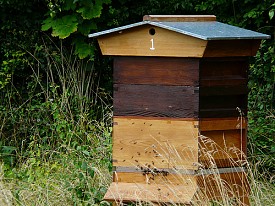Where to Put Your Beehive
 We love bees and beekeeping here at Networx, and if you're considering starting your own apiary this year, congratulations! Bees can be rewarding and tons of fun to keep, and thankfully there are numerous resources available to help you keep your bees happy, healthy, and productive -- chances are high that your community hosts bee hobbyists and enthusiasts who can help get you started with advice on subjects like what kind of hive to get and where to order your bees.
We love bees and beekeeping here at Networx, and if you're considering starting your own apiary this year, congratulations! Bees can be rewarding and tons of fun to keep, and thankfully there are numerous resources available to help you keep your bees happy, healthy, and productive -- chances are high that your community hosts bee hobbyists and enthusiasts who can help get you started with advice on subjects like what kind of hive to get and where to order your bees.
But you may have one remaining and critical question: uh, where to put the bees? Beehive placement is actually pretty important not just because you want to avoid upsetting the neighbors, but because you want to avoid upsetting the bees, and because where you place your hive can determine how healthy they are, the flavor of the honey they produce, and how well they settle into their new digs. So here's what you need to know!
Food and Water
Bees need a nice, steady supply of water a quick flight away. Your hive should be placed in close proximity to a water supply to ensure that they don't have to forage too far afield. Bees are attracted to the sound of running water, but they prefer still water, because it's safer for them, so make sure they have a supply of still water to drink. For that matter, there should be ample sources of pollen, nectar, and forage near the hive so the bees can easily sustain themselves and bring supplies back to the hive.
Not enough forage? Talk to a Los Angeles landscaper about planting a bee garden with lots of nectar and pollen-producing plants to stimulate honey production, and pay attention to how it affects the flavor of your honey.
The whole point of keeping bees is not to attempt to sustain them solely on supplements, but to get flavorful, dynamic honeys made by bees flying freely in the natural environment. To make honey, they need supplies of food! And the closer that food is...the more honey they'll make.
Light
Bees love sun. As soon as the sun is up, they're out and about, and they buzz around all day until the sun goes down. That means you should place the hive in a sunny spot so they don't turn slugabed and sleep in, and consider facing the hive south so the bees wake up as soon as the sun peeps up over the horizon. However, full sun can make a hive brutally hot in the summer, so go for a spot with dappled sunlight!
Shelter
A windbreak is key to protect the hives. Choose a sheltered nook, or build a windbreak, to safeguard the hive against harsh winds and weather. Be sure your hive is also placed in an area with adequate drainage to limit the risk of damp conditions, as bees don't appreciate being wet. Choose a site with firm ground, too, to avoid a toppling beehive!
Consider the Flight Path
When bees fly out of the hive, they don't have to file a flight plan with the FAA, and their main concern is getting some snacks. They don't really care about what, or who, might be in the way, so it's up to you to use some common sense: don't put a beehive near a footpath or other highly trafficked area, or someone's going to get a faceful of bees.
Neighbors
Too many hives can result in competition and poor honey quality for everyone. Check out the area around where you plan to set up to see how many hives are around, and talk to local apiarists about their bees. If the population is reaching critical mass, you may need to set up further afield or talk to someone nearby about working with their hives for a while until a chance to set up your own opens up.
Urban Bees
It can be a challenge to find a spot for urban bees, because forage is more limited and you have more people to deal with. One of the best spots is a community garden, and many community gardens are grateful for the opportunity to have resident pollinators. Talk to organizers about setting up your hives in the garden.
Your bees should be protected from big livestock like cows and horses who might view the hive as a scratching post and knock it over by accident. Furthermore, consider predation issues: skunks, for example, love beehives and can destroy them in just a few nights. Make sure your bees are well-protected! Sadly, vandalism is also an issue sometimes, so if you're concerned about that, secure fencing to keep out would-be vandals is a good idea.
Access
You're the one taking care of the hive, and remember that in the first few weeks, you may be there a lot. You need a location that's easy to get to by vehicle or on foot while pulling a small wagon filled with supplies, and make sure your access won't be blocked at some point by construction or other activities.
Katie Marks writes for Networx.com.
Updated May 31, 2018.
Looking for a Pro? Call us (866) 441-6648

Landscaping Average Costs
Landscapers Experiences

“Stealth” Tree Trimming Was An Incredibly Clean Job

Oak Tree Planting Looks Great In Our New Home’s Spacious Yard



